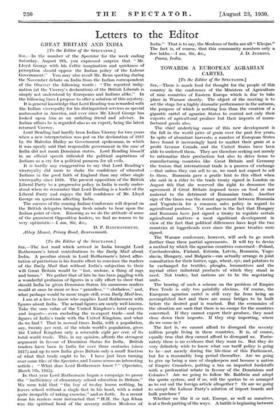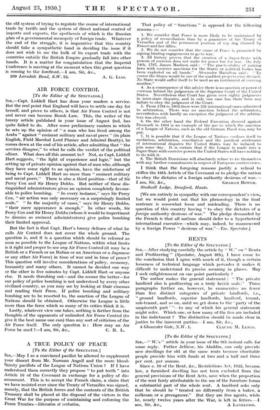TOWARDS A EUROPEAN AGRARIAN CARTEL
[To the Editor of the SPECTATOR.]
Sin,—There is much food for thought for the people of this country in the conference of the Ministers of Agriculture of nine countries of Eastern Europe which is due to take place in Warsaw shortly. The object of the meeting is to set the stage for a highly dramatic performance in the autumn, the purpose of which is nothing less than the creation of a gigantic cartel of agrarian States to control not only their exports of agricultural produce but their imports of manu- factured goods also.
The chief underlying cause of this new development is the fall in the world price of grain over the past few years. In spite of abundant harvests, a number of European States have found it increasingly hard to market their grain at a profit because Canada and the United States have been able to undersell them. They are therefore seeking not merely to rationalize their production but also to drive home to manufacturing countries like Great Britain and Germany the truism that international trade is a process of exchange that unless they can sell to us, we must not expect to sell to them. Rumania gave a gentle hint to this effect when she said in a rider to the trade treaty signed in London on August 6th that she reserved the right to denounce the agreement if Great Britain imposed taxes on food or raw material to the detriment of Rumanian trade. Another sign of the times was the recent agreement between Rumania and Yugoslavia for a common sales policy in regard to agricultural produce. Yet another is the fact that Hungary and Rumania have just signed a treaty to regulate certain agricultural matters—a most significant development in view of the fact that political differences have kept the two countries at loggerheads ever since the peace treaties were signed.
The Warsaw conference, however, will seek to go much further than these partial agreements. It will try to devise a method by which the agrarian countries concerned—Poland, Czechoslovakia, Finland, Estonia, Latvia, Rumania, Yugo- slavia, Hungary, and Bulgaria—can actually arrange in joint consultation for their butter, eggs, wheat, rye, and potatoes to be exchanged for textiles, ploughs, locomotives and the myriad other industrial products of which they stand in need. Not trades, but nations are to be the negotiating units.
The bearing of such a scheme on the problem of Empire Free Trade is only too painfully obvious. Of course, the European agrarian cartel is still very far from being an accomplished fact and there are many bridges to be built before the desired goal is reached. But the economics of the situation are such that there is no escape for the countries concerned. If they cannot export their produce, they must close down their imports. If they stop importing, where do we come in ?
The fact is, we cannot afford to disregard the seventy million people living in these countries. It is, of course, equally true that they cannot afford to disregard us. Fortu- nately there is no evidence that they want to. But they do
very definitely wish to know what our tariff policy is going to be—not merely during the life-time of this Parliament, but for a reasonably long period thereafter. Are we going to give up being a race of shopkeepers and become a nation of Empire Crusaders, putting a tax on imported foodstuffs with a preferential rebate in favour of the Dominions and Colonies ? Are we going to follow Mr. Baldwin and adopt the quota system, and if so, will the quotas be so arranged as to cut out the foreign article altogether ? Or are we going to accept the Labour Party's solution of import boards and bulk purchase ?
Whether we like it or not, Europe, as well as ourselves, is at a fresh parting of the ways. A battle is beginning between the old system of trying to regulate the course of international trade by tariffs and the system of direct national control of imports and exports, the apotheosis of which is the Russian plan of a governmental monopoly of foreign trade. Whatever the end of the struggle, it is imperative that this country should take a sympathetic hand in deciding the issue if it does not wish to see the bulk of its export trade with the countries outside the British Empire gradually fall into other hands. It is a matter for congratulation that the Imperial Conference is meeting at the moment when this great question is coming to the forefront —I am, Sir, &c.,
109 Lonsdale Road, S.W. 18. A. G. LIAS.

































 Previous page
Previous page